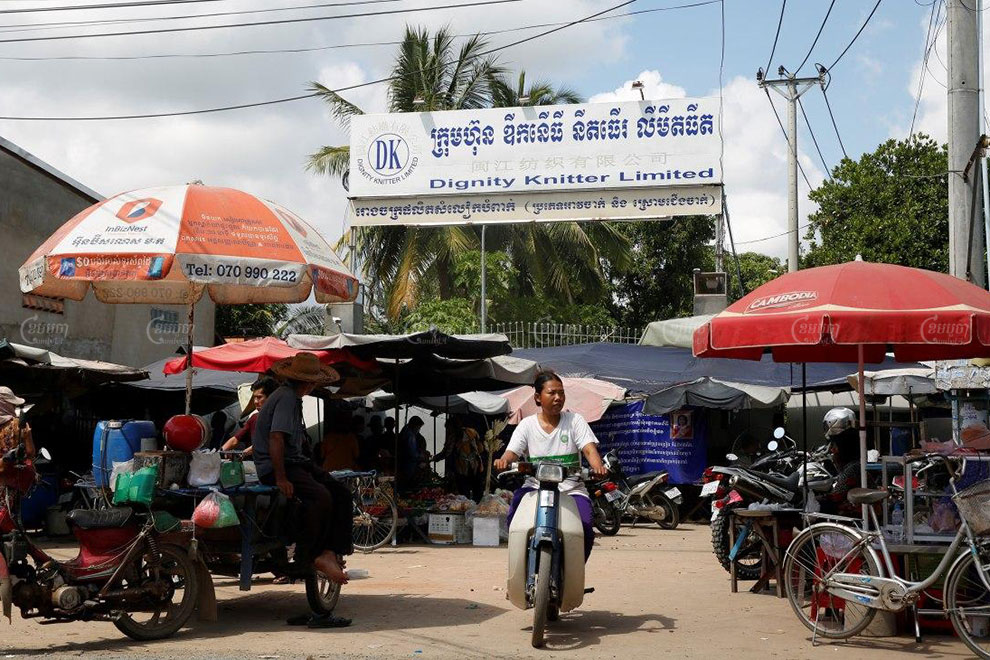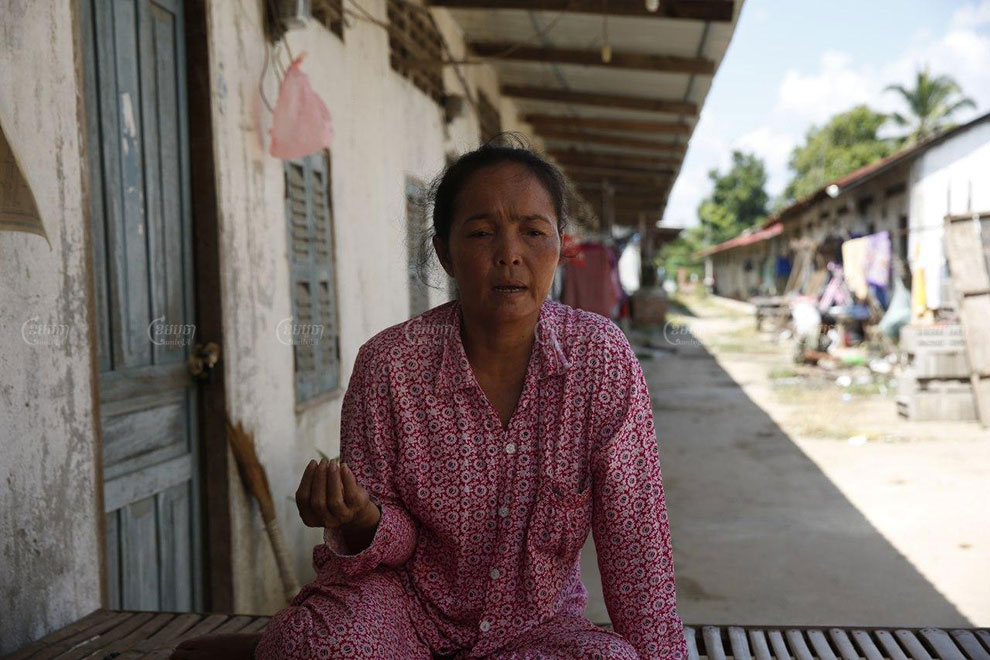Takhmao city’s Sitbou commune: A 47-year-old-woman sat on a bamboo bed in front of her rented room in Sitbou commune’s Prek Tapring village recalling the growing difficulties in her daily life after the garment factory in which she was employed had failed to pay workers for months, eventually shutting down.
“Starting from when the factory was closed, I have not had enough money for daily expenses,” Lim Sophat said. “So I borrowed $400 from my relatives since the factory has had problems for nearly eight months.”
Dignity Knitter and Eco Base, which have the same owner that are located in Takhmao, suspended operations in March after failing to pay workers for three months before finally closing in June.
For months, Sophat has tried to make ends meet by sewing clothes at a private shop and working at a mint farm.
“I was hired to harvest mint and I earn 600 riel per kilogram,” she said. “I can harvest more than 30 kilograms of mint per day but I have to work from 6am to 3pm.”
Sophat has a daughter in grade 8 who has lived with her aunt in Takeo province’s Angkor Borey district after Sophat lost her husband nearly a decade ago and was not able to take care of her daughter while working full time at the garment factory. Now, with schools closed due to Covid-19, Sophat has brought her daughter to live with her in Takhmao.
“When the factory was shuttered, it was difficult to get money to buy food everyday, plus pay rent for my room, water, electricity and provide money to support my daughter’s studies,” Sophat said. “Now, I have had to cut back my spending on daily food and clothes and other expenses.”
She said she and more than 1,000 other workers from Dignity Knitter and Eco Base are still waiting for the government to help them find a solution.
“I appeal to the authorities and the government to help solve this faster,” Sophat said, adding that when she finally receives her wages and benefit pay, she will repay her personal loans then decide whether to return home to Angkor Borey district, or find a new job in Takhmao.
In mid-July, workers submitted a petition to the Kandal provincial government asking for help dissolving a court injunction that is preventing equipment at the two factories from being sold to pay workers. The original injunction was requested by a Chinese company that also claims it is owed compensation by the owner of Dignity Knitter and Eco Base.

Hean Saorun, 35, who was employed at Dignity Knitter factory for more than 14 years before it closed, said outside the factory that since the owner had stopped paying wages in January, workers had divided into seven teams to take shifts providing 24-hour security at the factory.
“We started to guard day and night since the factory’s problems began in January,” Saorun said, adding that each team at first had between 50 workers to 60 workers but now, they were reduced to 10 workers per team guarding one day per week.
She explained that workers are standing guard because they are afraid factory representatives or another group might secretly remove equipment from the factory, leaving former employees with no hope of receiving payment in the future.
“We need to be able to afford food for ourselves everyday but sometimes, workers who do not have time to stand guard will show support by giving us a small budget to buy food for the team on guard,” Saorun said.
“I’m concerned about our safety while we stand guard at night because previously, a group of people drove their motorbikes back and forth many times in front of the factory near where we sleep, so it made us concerned for our safety,” Saorun said. “But we have no choice.”
Saorun said that since the factory had closed, she could not contribute to help her parents repay the $20,000 loan they took out three year ago to start a vegetable farm and pay her father’s hospital bills.
Phin Sophea, a Coalition of Cambodian Apparel Workers Democratic Union (CCAWDU) representative who was also employed at Dignity Knitter factory for 14 years, said there had not been any progress in the case since more than 200 workers marched to bring a petition to the Kandal provincial court on July 13.
“As of July 28, I have not received any clear new information from the Labor Ministry representative and the Kandal provincial governor,” Sophea said.
He said he had only received a message via Messenger from the former factory owner last week saying the provincial court had dissolved the injunctions and would finalize inventory of the property soon.
He said that he had previously been told by the Labor Ministry’s conflict resolution representative Ou Ratana that progress had been slow in the case because the court procedures were complicated.
“I request Samdech prime minister and relevant parties help to solve the case quickly,” Sophea said, adding that if there is no solution, he will meet with workers to determine their next plan of action.
Un Sal, 68, who worked as a cleaner at Dignity Knitter factory for more than 10 years, said with tears streaming down her face that since the company had closed, she had been struggling to pay for her food and medical needs.
“Now I do not have money to buy rice and food to eat and I got sick,” Sal said, wiping away tears with the collar of her shirt. She said that due to her advanced age, she could not find another job and could not support her son, who has a mental illness.
“I have high blood pressure and I do not have money to buy medicine,” Sol said, adding that she had not been able to pay rent since March.
“I request the authorities and prime minister help solve the problem for me and other workers soon,” she said. “I do not have money now and I am only surviving because some workers at the factory have given me some money.”
Ou Ratana, deputy secretary-general of the Committee for the Resolution of Strikes and Demonstrations at the Labor Ministry confirmed that after his committee had held talks with the Kandal provincial governor in mid-July, the provincial court had dissolved all three injunctions and could now proceed with taking inventory at the factories. The three parties that had requested injunctions to stop the factories’ assets from being used to pay workers included a transportation company, a Chinese business and a firewood supplier.
“On Monday next week, our joint committee will hold a meeting to decide whether we will continue our inventory of the equipment,” Ratana said.
He added that the joint committee made up of local and ministry officials will implement the plan quickly to help the former employees.
“We are concerned about the workers [staying outside] because it is rainy season, but for the necessary procedures, we can not finish it in only one day,” Ratana said.
Kandal Provincial Governor Kong Sophorn confirmed that the court had dissolved the three injunctions filed since March this year.
“Now, we have dissolved all injunctions and we are inventorying all properties of the company based on the procedure to sell it to pay our workers,” Sophorn said.
Thousands of other garment and footwear industry workers are in a similar situation to those at Dignity Knitter and Eco Base. About 1,000 workers from Violet Apparel Factory in Phnom Penh’s Sen Sok district had also gone months without receiving wages or compensation pay, culminating in a protest on July 23 in which 100 workers attempted to march to Prime Minister Hun Sen’s house to deliver a petition on July 23. They were blocked by about 50 police officers and Tuol Kork district security guards on Kampuchea Krom Boulevard in Phsar Depot 1 commune.
The workers returned again on July 29 and successfully submitted the petition seeking help July 29 with the premier’s cabinet officials at Wat Botum park in Daun Penh district.
Labor Ministry spokesman Heng Sour could not be reached for comment.
In the middle of this month, Khun Tharo, program manager of the Center for Alliance of Labor and Human Rights (Central) said that 12 factories employing a total of nearly 15,000 people have closed.
Other factories that have held demonstrations this year asking for the government’s help in receiving payments include Hana (Cambodia) 1 factory in Phnom Penh, New Best Global Textile Co., Ltd in Kampong Speu province, Dignity Knitter and Eco Base factories in Kandal province, and Thai Ya Garment factory also in Kandal province.
Representatives of Hana 1, New Best Global Textile, and Thai Ya factory say they resolved all pay issues in July.
Meanwhile, Sophat and the other teams of former employees will continue to stand guard outside Dignity Knitter and Eco Base as they cling to hope that the government will be able to secure their payments.
“We have been waiting for a solution for a long time,” Sophat said.
“I have a little hope because the factory representatives have promised many times that they will solve the problem for workers, however we still have no solution today,” she said.








